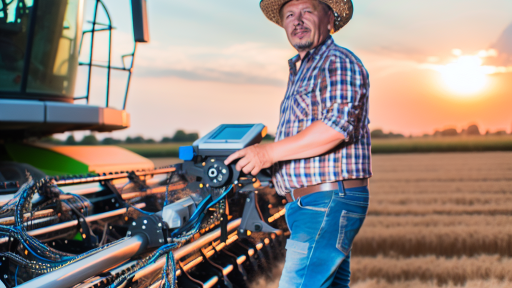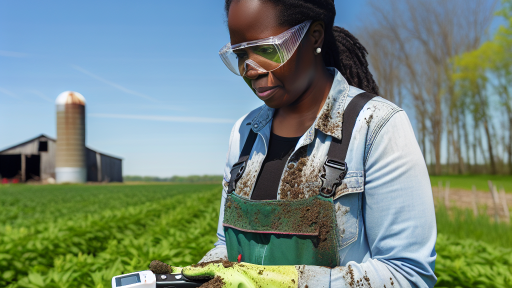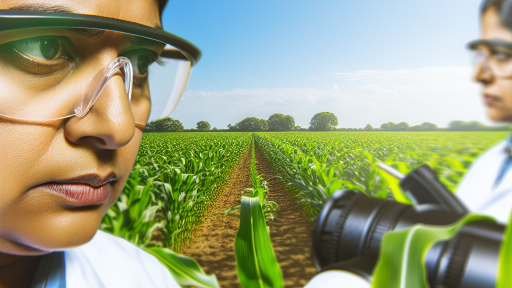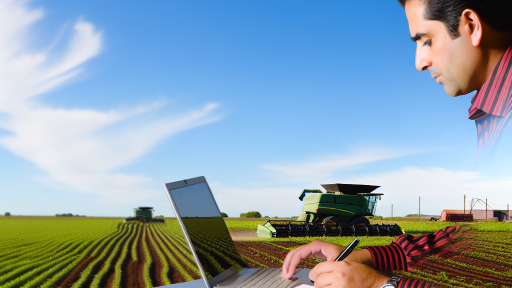Introduction to Smart Irrigation and Precision Agriculture
Smart irrigation integrates technology to enhance water management in agriculture.
This approach utilizes real-time data to optimize water usage.
Precision agriculture employs technology to monitor and manage field variability.
Both methods aim to increase efficiency and reduce waste.
Defining Smart Irrigation
Smart irrigation systems automatically adjust water delivery based on weather conditions.
These systems rely on sensors to determine soil moisture levels.
Farmers can program irrigation schedules using mobile applications.
Furthermore, they can track water usage through digital platforms.
Understanding Precision Agriculture
Precision agriculture utilizes satellite imagery and GPS technology.
This technology allows farmers to analyze field data intricately.
Farmers can identify specific areas requiring attention.
By doing this, they can apply resources more accurately.
Benefits of Smart Irrigation
Smart irrigation helps conserve water resources effectively.
It minimizes water runoff and enhances crop growth.
Moreover, it reduces labor costs through automation.
Transform Your Agribusiness
Unlock your farm's potential with expert advice tailored to your needs. Get actionable steps that drive real results.
Get StartedFarmers can expect higher yields with fewer inputs.
Advantages of Precision Agriculture
Precision agriculture increases productivity while reducing costs.
Farmers can apply fertilizers and pesticides more effectively.
This targeted application lessens environmental impact.
Additionally, it enables better crop management decisions.
Combining Both Approaches
Combining smart irrigation and precision agriculture maximizes benefits.
This synergy leads to improved resource management.
Farmers can achieve higher economic returns with sustainable practices.
As technology advances, opportunities for innovation increase.
Overview of Smart Irrigation Technologies
Definition of Smart Irrigation
Smart irrigation refers to advanced systems that optimize water use in agriculture.
These technologies incorporate various sensors and automation tools.
As a result, they ensure crops receive the right amount of water.
Types of Smart Irrigation Systems
Several types of smart irrigation technologies are available today.
Drip irrigation delivers water directly to plant roots.
Sprinkler systems offer a more traditional approach but with advanced control features.
Subsurface irrigation places pipes underground for efficient water delivery.
Technological Components
Smart irrigation relies on key technological components to function effectively.
Sensors assess soil moisture levels in real-time.
Weather stations track environmental conditions, such as temperature and rainfall.
Control systems allow farmers to automate irrigation schedules based on data.
Benefits of Using Smart Irrigation
Implementing smart irrigation can significantly benefit farmers.
It enhances water efficiency, reducing overall water usage.
This approach leads to cost savings over time.
Plus, smart irrigation improves crop yields by providing optimal water levels.
Showcase Your Farming Business
Publish your professional farming services profile on our blog for a one-time fee of $200 and reach a dedicated audience of farmers and agribusiness owners.
Publish Your ProfileChallenges in Adoption
Despite its advantages, some challenges exist in adopting smart irrigation technologies.
High initial investment costs can deter some farmers.
Additionally, technical know-how is often required for effective implementation.
Moreover, varying climate conditions can affect technology performance.
Future Trends in Smart Irrigation
The future of smart irrigation looks promising with continuous advancements.
Integrating artificial intelligence may enhance decision-making processes.
Furthermore, improved sensor technologies will drive efficiency even further.
Benefits of Smart Irrigation for Water Conservation
Enhanced Water Use Efficiency
Smart irrigation systems optimize water usage in agriculture.
They deliver the right amount of water at the right time.
This efficiency reduces water waste significantly.
Farmers can achieve optimal crop growth while conserving water.
As a result, they lower irrigation costs and improve productivity.
Environmental Impact
Using smart irrigation aids in protecting local ecosystems.
It minimizes runoff and reduces the risk of soil erosion.
This approach enhances groundwater recharge and quality.
Healthy ecosystems contribute to biodiversity preservation.
Data-Driven Decision Making
Smart irrigation leverages advanced technology and data analytics.
Farmers receive real-time data on soil moisture and weather conditions.
This information helps them make informed irrigation decisions.
Consequently, they can adjust watering schedules effectively.
Economic Benefits for Farmers
Smart irrigation systems reduce the overall cost of water supplies.
This technology can increase crop yields significantly.
As a result, farmers see improved return on investment.
Additionally, they can access government subsidies for implementing these systems.
Adaptation to Climate Change
Smart irrigation solutions help farmers adapt to changing weather patterns.
These systems allow for efficient water management under drought conditions.
Farmers can adjust their irrigation practices based on climate forecasts.
Thus, they ensure crop resilience in the face of climate variability.
Discover More: Overcoming Challenges In Crop Disease Detection Systems For Farmers
Impact of Precision Agriculture on Crop Yield and Quality
Enhancing Crop Yields
Precision agriculture significantly boosts crop yields.
Farmers utilize data-driven techniques to optimize input use.
By applying water, fertilizer, and pesticides in precise amounts, they increase efficiency.
Furthermore, this method minimizes waste and maximizes productivity.
Improving Crop Quality
In addition to yields, precision agriculture enhances crop quality.
Farmers can monitor soil conditions and plant health closely.
This close monitoring leads to better disease and pest management.
As a result, crops often exhibit improved taste and nutrition.
Cost-Efficiency and Resource Management
Precision agriculture promotes cost efficiency in farming operations.
It lessens the need for excessive labor and resources.
Farmers can allocate their budget more wisely, leading to greater profits.
Showcase Your Farming Business
Publish your professional farming services profile on our blog for a one-time fee of $200 and reach a dedicated audience of farmers and agribusiness owners.
Publish Your ProfileMoreover, this approach conserves water and reduces environmental impact.
Data-Driven Decision Making
Data analysis plays a crucial role in precision agriculture.
Farmers depend on technology to gather insights about their fields.
These insights aid in making informed decisions for crop management.
Consequently, this leads to more effective farming practices.
Long-Term Sustainability
Precision agriculture contributes to sustainable farming practices.
By optimizing inputs, it supports long-term soil health and productivity.
Additionally, it helps farmers adapt to changing climate conditions.
Thus, precision agriculture fosters both economic and environmental sustainability.
Discover More: Overcoming Financial Challenges In Farming With Agri-Fintech Tools
Cost-Effectiveness of Smart Irrigation Systems
Initial Investment and Long-Term Savings
Smart irrigation systems require an initial investment.
This cost often deters farmers from upgrading their systems.
However, these systems provide significant long-term savings.
They minimize water waste by delivering precise amounts of moisture.
Consequently, farmers can significantly reduce water bills.
Energy Efficiency
Smart irrigation systems also enhance energy efficiency.
Traditional irrigation methods consume excess energy.
In contrast, smart systems optimize pump usage.
Thus, they lower energy costs associated with water delivery.
Reduction in Labor Costs
Implementing smart irrigation can reduce labor needs.
With automation, farmers spend less time managing irrigation schedules.
This allows them to allocate resources to other critical tasks.
Ultimately, it boosts overall farm productivity.
Crop Yield Improvement
Smart irrigation contributes to improved crop yields.
By ensuring appropriate moisture levels, crops thrive.
Healthy crops tend to yield more produce and better quality.
As a result, farmers see increased profitability over time.
Environmental Benefits
These systems offer notable environmental advantages.
They facilitate responsible water usage, conserving resources.
Proper irrigation reduces runoff and prevents soil erosion.
Additionally, a decreased dependency on chemical fertilizers occurs due to healthy soil conditions.
This leads to a more sustainable farming practice overall.
Gain More Insights: The Role Of Blockchain In Modernizing Agricultural Supply Networks
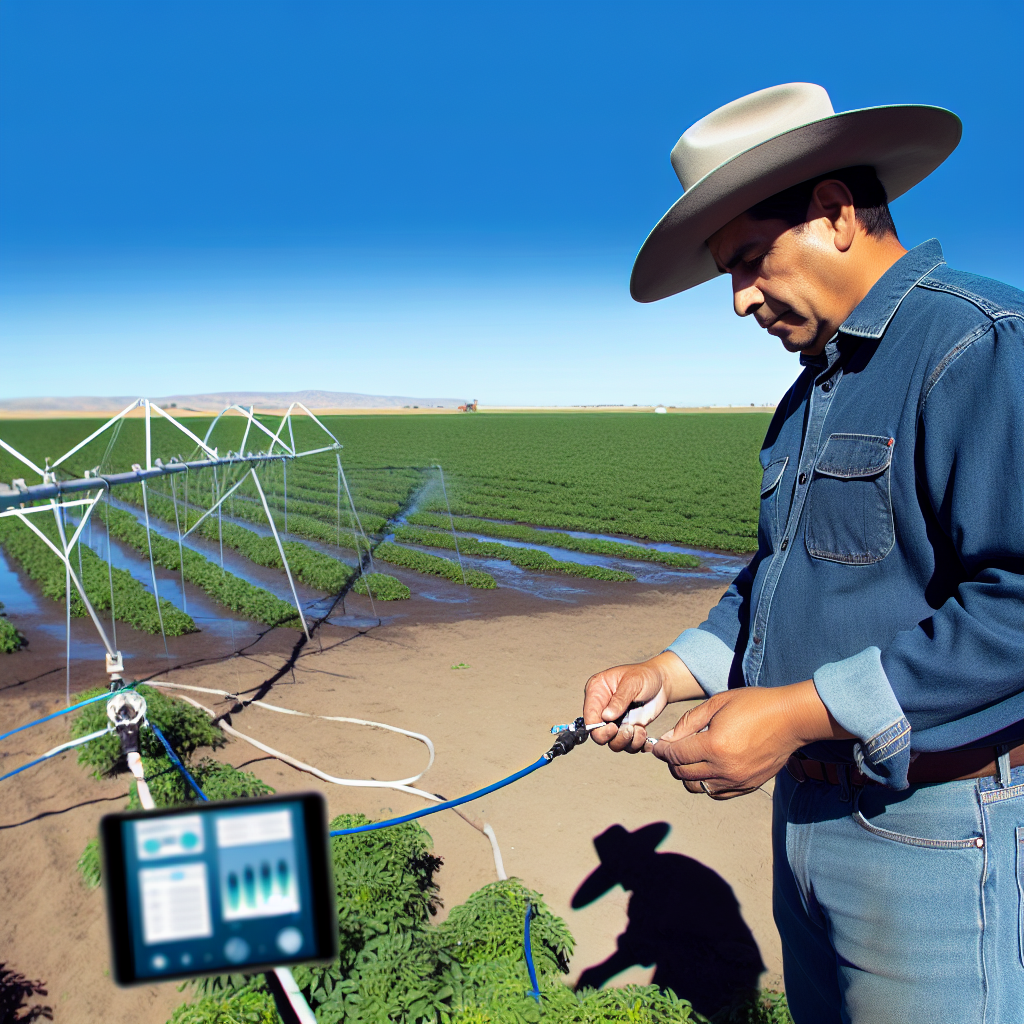
Case Studies: Successful Implementations of Smart Irrigation
Overview of Successful Projects
Numerous projects highlight the benefits of smart irrigation systems.
Farmers are embracing technology to optimize water usage.
Several case studies showcase varied approaches and results.
The Green Valley Farm Initiative
Green Valley Farm implemented a sophisticated smart irrigation system.
This system uses soil moisture sensors to guide watering schedules.
As a result, water consumption reduced by 30%.
Additionally, crop yield increased by 15% in the first year.
Showcase Your Farming Business
Publish your professional farming services profile on our blog for a one-time fee of $200 and reach a dedicated audience of farmers and agribusiness owners.
Publish Your ProfileThe EcoAgro Project
EcoAgro introduced precision irrigation methods across multiple fields.
The system incorporated satellite imaging and data analytics.
Farmers achieved a 40% reduction in water waste.
Equally important, they realized higher profits due to better crop quality.
Community-Based Initiatives
In a community program, local farmers collaborated on smart irrigation practices.
The group utilized shared resources and technology.
This cooperation led to collective water savings of 25%.
Moreover, participants reported improved crop health and sustainability.
Challenges and Solutions
Every project faced unique challenges during implementation.
For instance, initial costs deterred some farmers from adopting the technology.
Education about long-term savings proved essential in overcoming hesitations.
Additionally, ongoing support from technology providers made a significant difference.
Future Prospects
The success of these case studies encourages wider adoption of smart irrigation.
As technology becomes more accessible, farmers will likely invest more.
Innovations in sensors and software will further enhance the effectiveness of these systems.
Ultimately, such advancements promise to revolutionize irrigation practices in agriculture.
You Might Also Like: Integrating IoT Solutions for Livestock Management
Challenges and Limitations of Adopting Smart Irrigation
Financial Constraints
Implementing smart irrigation systems requires a significant initial investment.
Many farmers struggle to secure the necessary funding.
Consequently, they may opt for traditional irrigation methods instead.
Moreover, ongoing maintenance costs can be prohibitive.
Technical Expertise
Smart irrigation systems often require specialized knowledge.
Farmers may not possess adequate training or experience.
This technical gap can hinder effective system management.
Additionally, a lack of local support services complicates installation issues.
Data Management Challenges
Smart irrigation relies heavily on data analytics.
Farmers must interpret complex data to make informed decisions.
Unfortunately, not all users are comfortable with data analysis tools.
As a result, they may underutilize the technology’s full potential.
Infrastructure Limitations
Some regions lack the necessary infrastructure for smart systems.
For instance, poor internet connectivity can disrupt system effectiveness.
Moreover, outdated water distribution networks may be incompatible.
These infrastructural shortcomings can limit smart irrigation’s advantages.
Environmental Considerations
Smart irrigation methods may face regulatory hurdles in some areas.
Local laws may restrict changes in water usage patterns.
Also, environmental concerns can influence system implementation.
Farmers must balance smart technology benefits with sustainability practices.
Market Dynamics
Market fluctuations can impact the viability of smart irrigation investments.
Changing crop prices may deter farmers from making the switch.
Market competition also plays a critical role in adoption rates.
Showcase Your Farming Business
Publish your professional farming services profile on our blog for a one-time fee of $200 and reach a dedicated audience of farmers and agribusiness owners.
Publish Your ProfileUltimately, economic pressures can dictate technological advancements.
Future Trends in Smart Irrigation and Precision Agriculture
Integration of IoT Technology
The Internet of Things (IoT) transforms smart irrigation systems.
Sensors collect real-time data on soil moisture and weather conditions.
This information allows for precise watering based on plant needs.
Furthermore, it enables farmers to optimize resource use efficiently.
Advancements in Data Analytics
Data analytics plays a crucial role in precision agriculture.
Farmers can analyze historical data for better decision-making.
Additionally, predictive analytics helps forecast crop yields and pest issues.
This foresight allows for timely interventions and optimized planting strategies.
Increased Use of Drones
Drones are becoming essential tools in smart agriculture.
They provide aerial views of fields to identify problem areas quickly.
Drones can also assist in planting and crop monitoring with precision.
Moreover, they enhance data collection efforts with high-resolution imagery.
Sustainability and Resource Efficiency
Future trends emphasize sustainable practices in agriculture.
Smart irrigation reduces water consumption significantly.
This approach conserves water while maintaining crop health.
Additionally, integrating renewable energy sources supports sustainability efforts.
Adoption of AI and Machine Learning
Artificial intelligence (AI) offers powerful insights into farming practices.
Machine learning models analyze vast amounts of agricultural data.
These models predict plant health and optimize fertilizer use.
Ultimately, AI enhances overall crop management efficiency.
Collaboration and Data Sharing
Collaboration among farmers leads to improved practices.
Sharing data fosters community-driven solutions to common challenges.
Such partnerships can leverage technology for mutual benefits.
This integration enhances knowledge transfer and resource sharing.
Additional Resources
New Agriculture Technology in Modern Farming
AI in Agriculture and Farming: Revolutionizing Crop Growth – Intellias

